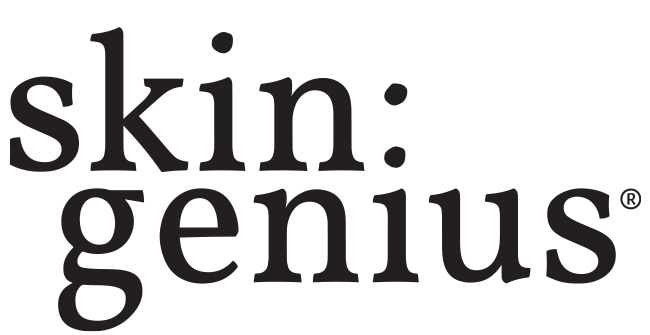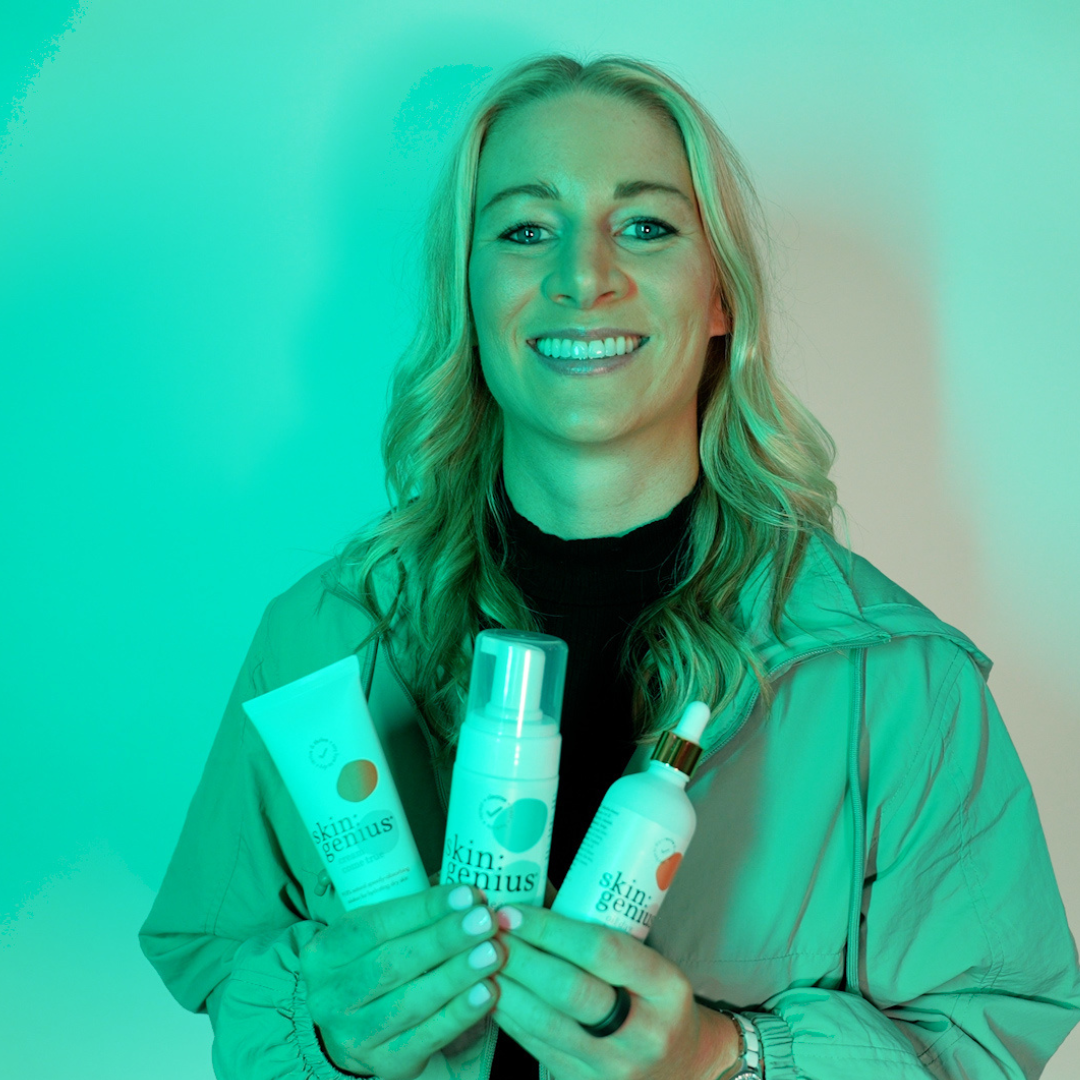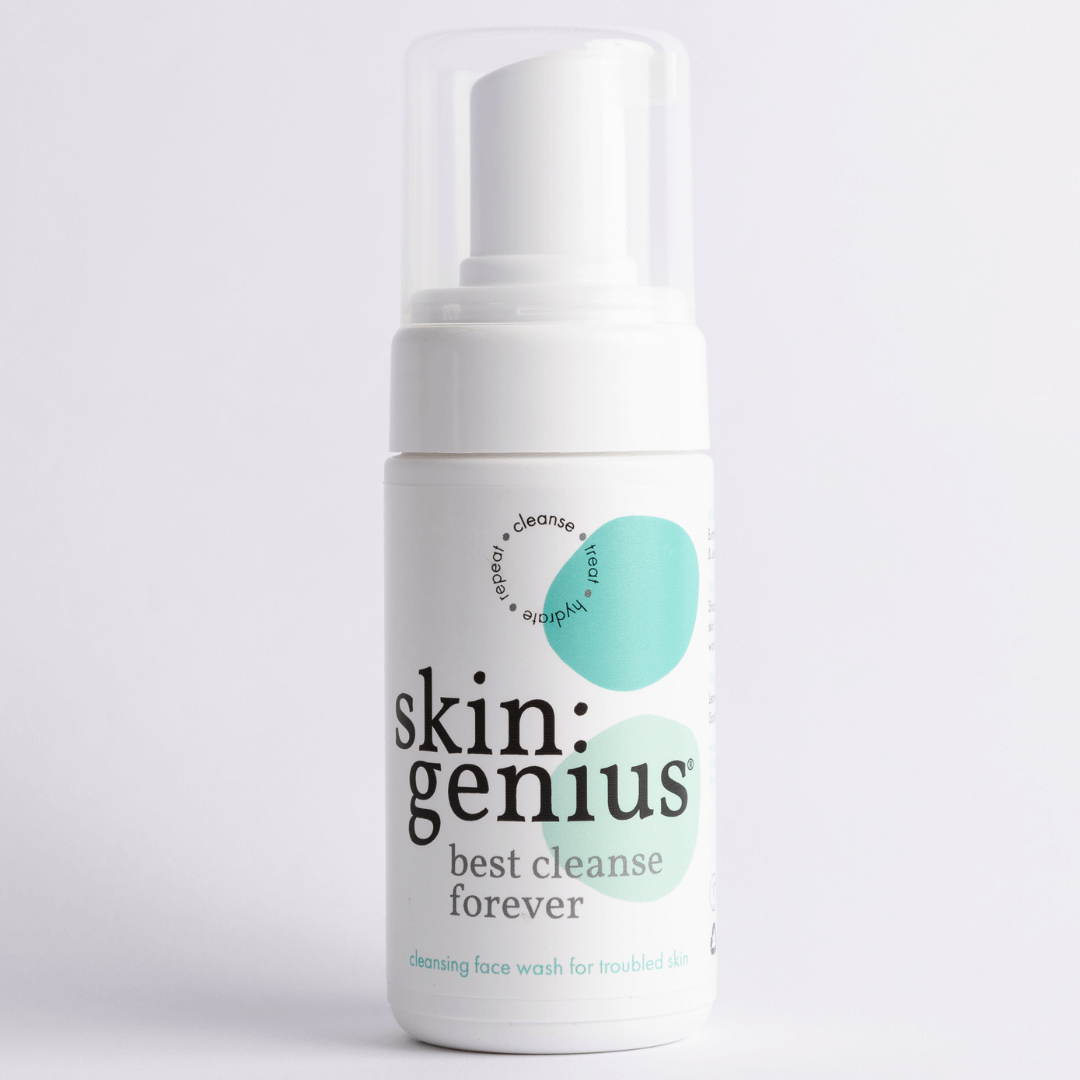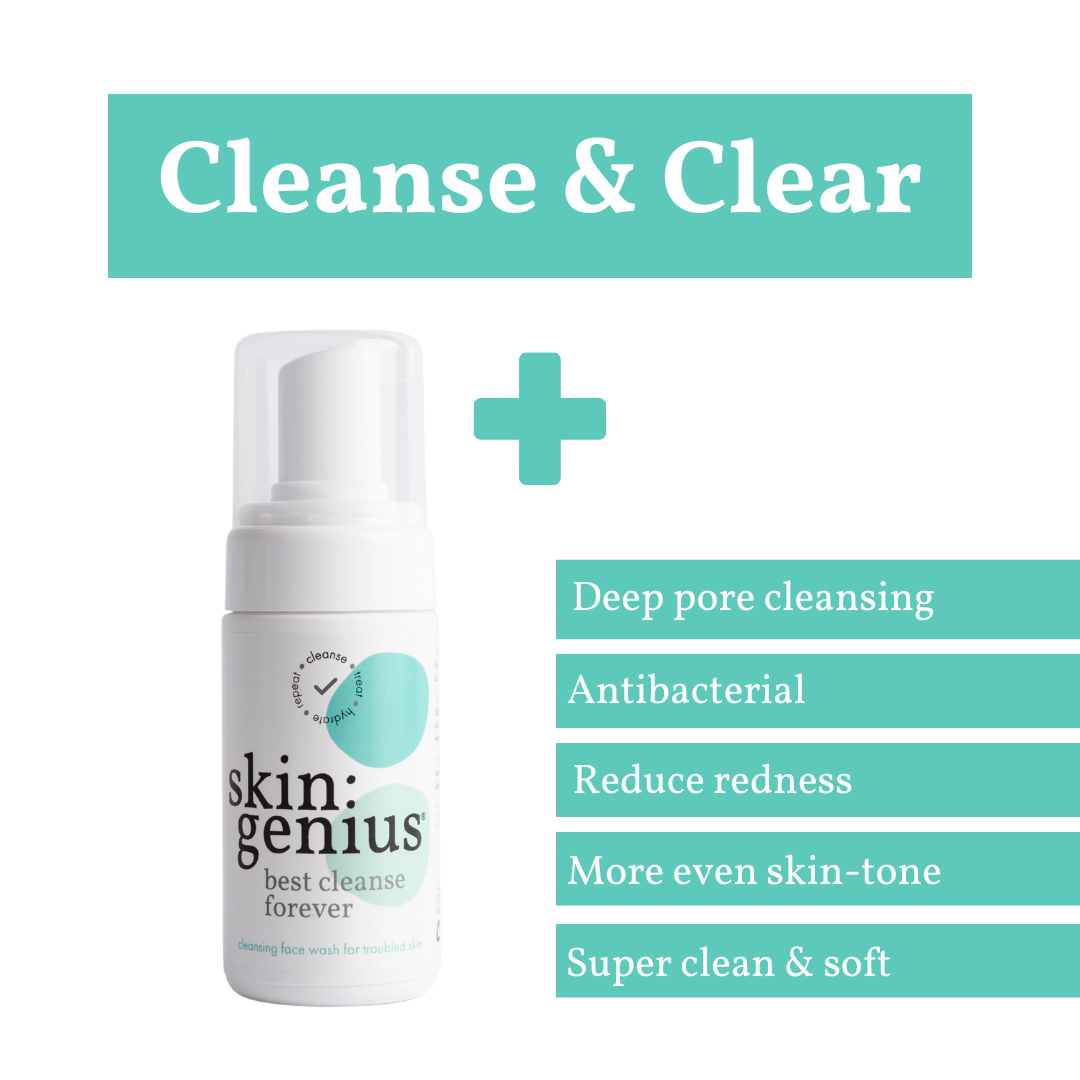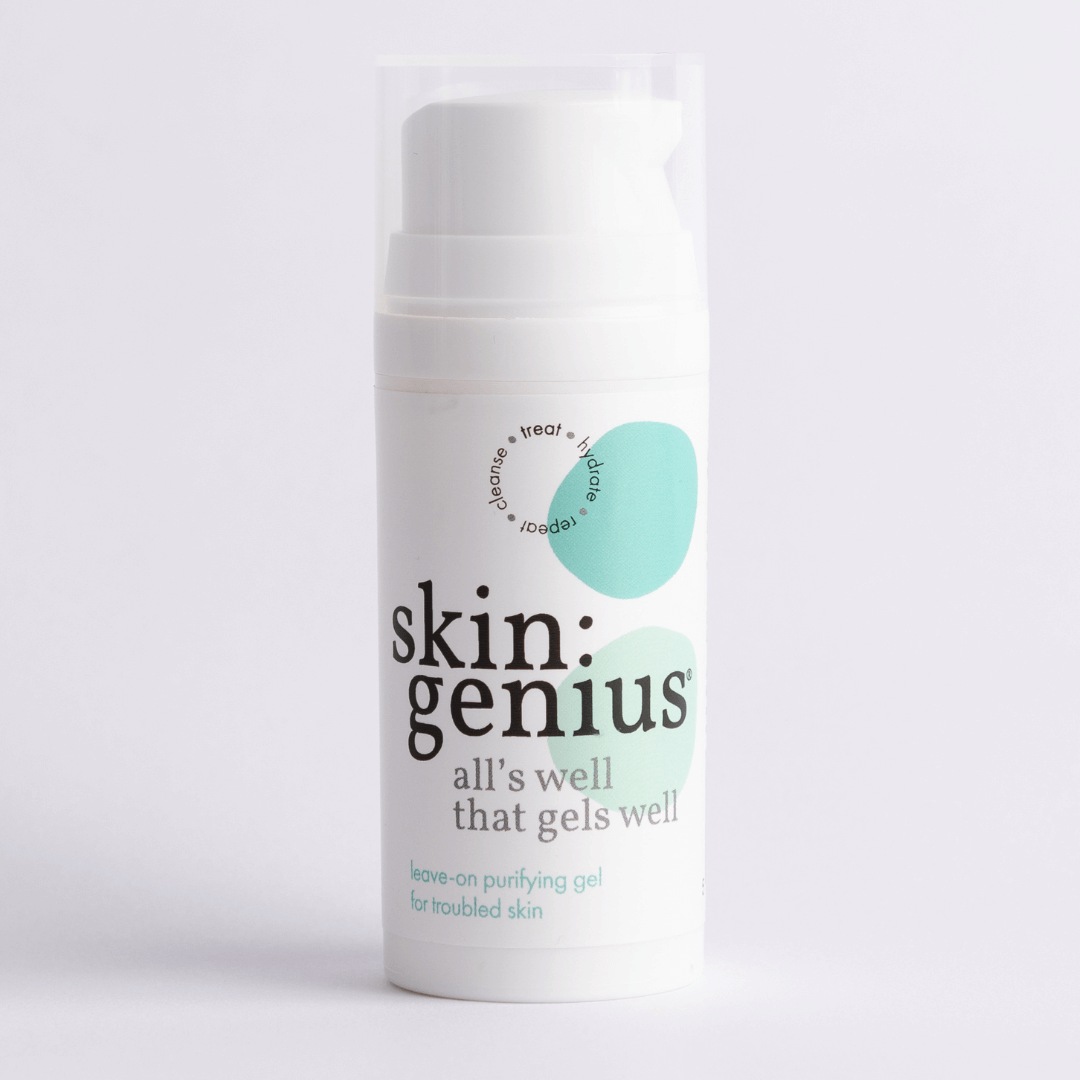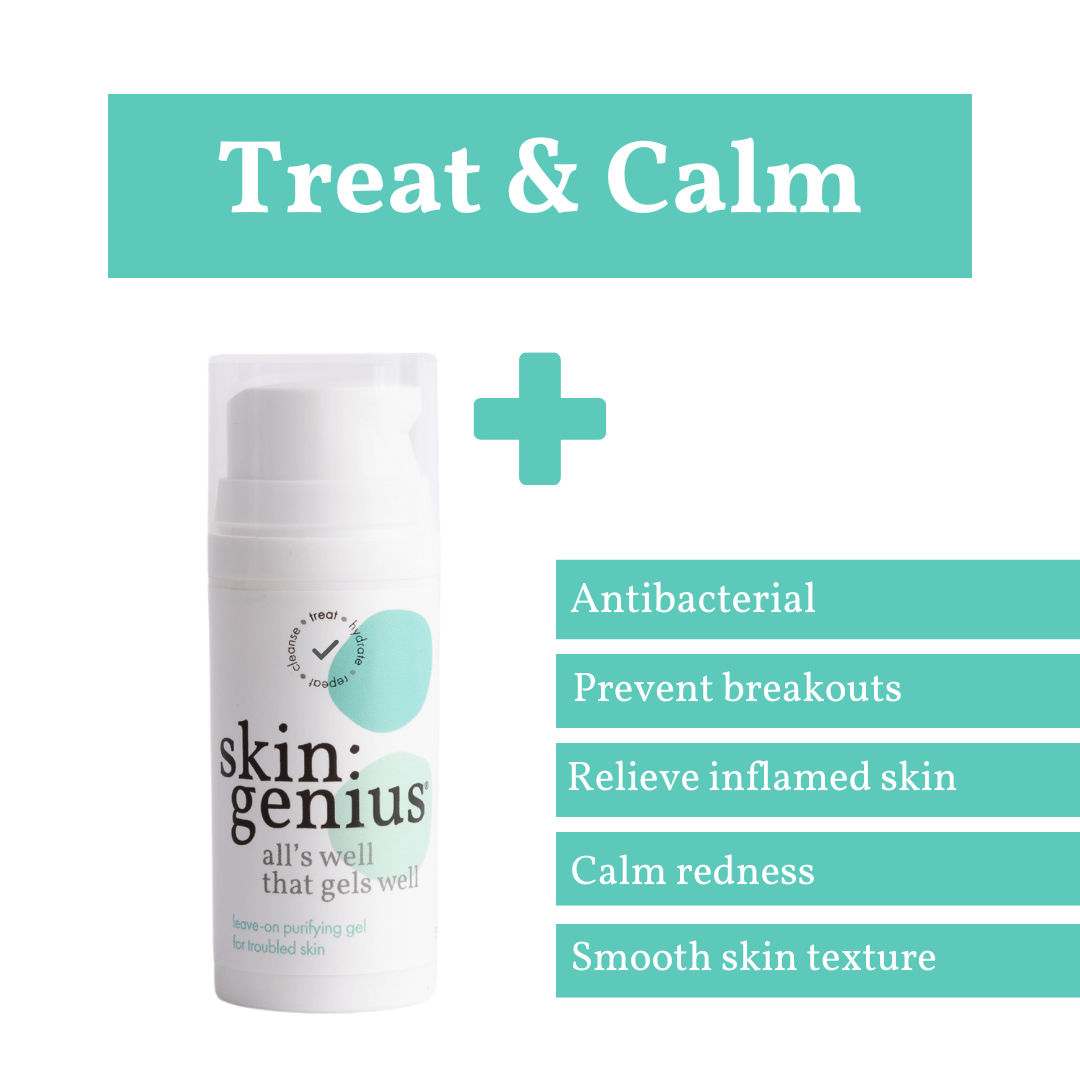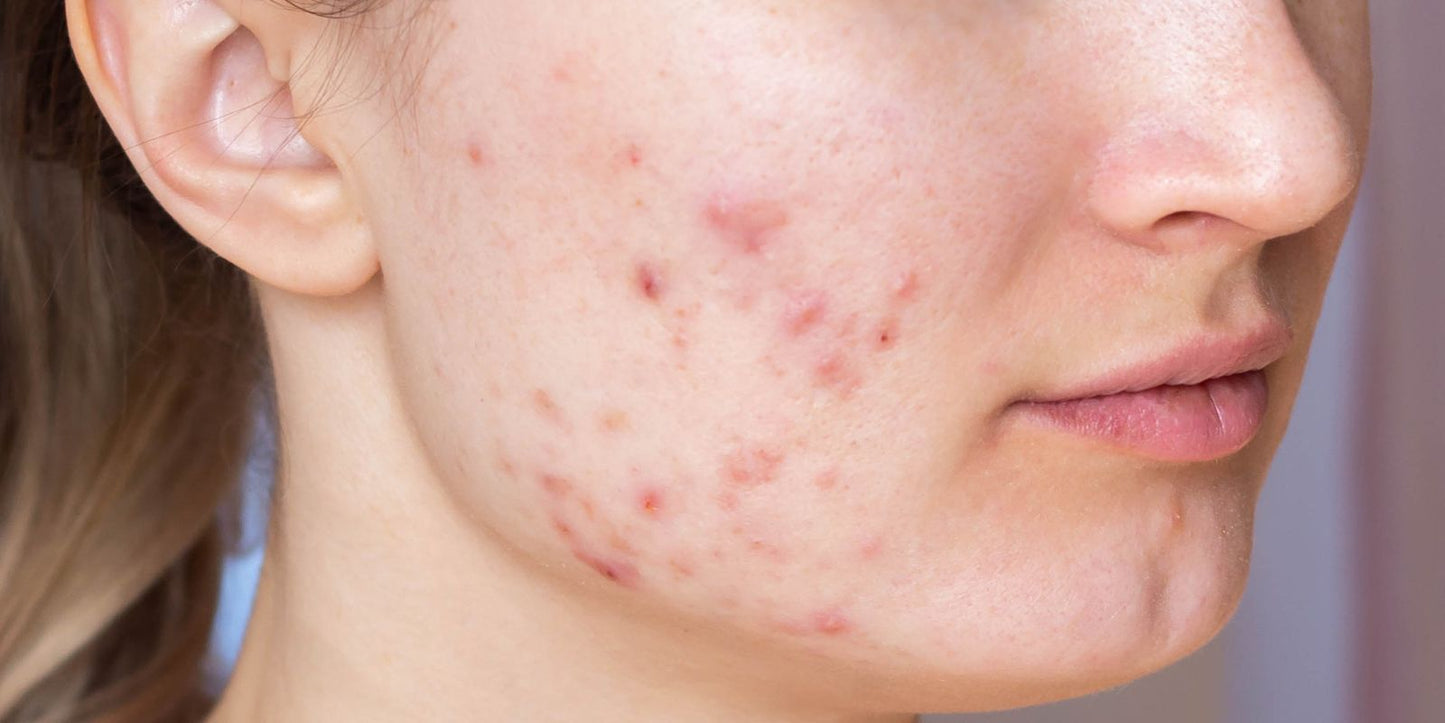
Did you know that acne is one of the most common skin conditions in the UK? It is estimated to affect up to 95% of teenagers, with 20-35% experiencing moderate or severe symptoms.1 Generally associated with adolescence and early 20s, it can occur at any age, with a higher incidence of adult acne in women than men.
Acne presents as a chronic inflammatory skin condition, characterised by excessive sebum production and blocked pores. Outbreaks of blackheads and whiteheads (known as comedones) manifest when skin follicles become blocked with dead skin cells and oil. Excessive sebum production results in an oily, nutritious environment where bacteria can grow and thrive on the skin.
A proliferation of bacteria named Cutibacterium acnes (formerly known as Propionibacterium acnes (P. acnes)) has been specifically associated with this skin condition. Bacteria overgrowth can provoke an immune response that fuels inflammation, showing up as skin redness accompanied by raised bumps and spots, known as papules and pustules.
Factors that influence the onset and severity of this condition include
- Genetics
- Hormonal shifts
- Stress levels and
- Dietary patterns or
- Poor gut health amongst others.
Today’s blog is about empowering you with the knowledge and tools to navigate Acne with confidence, no matter where you are at in your life.
What Is The Relationship Between Acne And Hormones?
The answer to this question, is wide ranging but to keep it simple, here are a few facts you should know.
- Acne and Hormonal Shifts
The onset of acne is associated with the increase in sex hormones in puberty. Increased sebum production (seborrhoea) is affected by hormones, particularly androgens such as testosterone and dihydrotestosterone (DHT) in both men and women.
Research studies have found that adult women with acne have elevated levels of testosterone.2 Polycystic ovary syndrome (PCOS) is a condition associated with raised androgen levels; it has been estimated that 70% of women with this syndrome have acne symptoms.2
- Acne and the Menstrual Cycle
Menstruating women dealing with acne may notice flare ups just before or on the initial days of their period due to the fluctuations of hormones that take place at this time in their cycle. From a nutrition perspective, those who experience acne alongside premenstrual syndrome may want to consider supporting hormones with magnesium and vitamin B6, or the traditional herb Vitex Agnus Castus (Chasteberry).
- Acne and the Menopause
In menopause, there is a significant decline in oestrogens with androgen levels remaining the same or even increasing, this leads to a hormonal environment conducive to the development of acne. Oestrogen is reported to have a beneficial effect on skin, decreasing sebum production. Women suffering from menopausal acne may find the addition of plant phytoestrogens in the diet helpful. Foods rich in phytoestrogens include tofu and flaxseeds. Red clover is a well-researched botanical, traditionally used for its isoflavones (plant phytoestrogens) in menopause.
- Acne and Stress
Heightened stress levels can worsen symptoms, with hormones and chemicals released during times of stress increasing sebum production and inflammation. Unfortunately, acne can cause considerable stress which can impact on psychological health, resulting in increased risk of anxiety, depression and low self-esteem.1
What Is The Connection Between Dietary Patterns And Acne?
Aiming for a perfect diet for your skin is close to impossible, and trying to achieve the perfect diet could also be stressful. However, it is important for you to understand how certain foods or dietary patterns can make a difference to your skin. It is also the reason why, aiming to adopt a holistic approach to your skin and lifestyle is important, i.e. looking at skin routine and hygiene, skincare products, and lifestyle factors.
Blood Sugar Balancing Diet:
Studies suggest a link between insulin resistance and poor blood sugar regulation with the severity of acne. It is thought that high insulin levels can stimulate seborrhoea (excess sebum production). Balancing blood sugar levels through dietary adjustments may have a positive beneficial effect on acne symptoms. Insulin receptors on the adrenal glands and ovaries stimulate androgen production. Hence, balancing blood sugar levels through dietary adjustments may also play a supportive role in balancing excess androgens linked to acne.
- Consume a wholefood diet, low in ultra-processed foods and refined sugars, and high in dietary fibre to avoid spikes in blood glucose and insulin.
- Incorporate foods that support healthy blood sugar control and carbohydrate metabolism such as fresh berries, green tea and cinnamon powder.
- Micronutrient deficiencies in Chromium, Zinc and Magnesium may increase risk of greater insulin sensitivity. Supplementing these nutrients may be supportive if dietary intake is insufficient.
Research shows that omega 3 fatty acids have a role to play in healthy anti-inflammatory pathways, whereas excessive omega-6 fatty acids in the diet may promote inflammation.
- Balance your intake of omega-3 to omega-6 by minimising products that contain vegetable margarines and processed seed oils (such as sunflower and corn oils) and increasing dietary intake of omega-3 rich oily fish or flax oil.
- Evening primrose oil contains gamma-linoleic acid (GLA), a fatty acid with anti-inflammatory actions for skin health.
Antioxidant Power:
Within a balanced and varied diet, emphasise foods such as brightly coloured vegetables to ensure adequate intake of skin supporting nutrients.
- Antioxidants such as Vitamins A, C and E are important nutrients in the diet that help maintain the skin health. Vitamin C is especially indicated for acne as it is known to contribute to skin integrity and collagen production.
- Zinc is an essential micronutrient and antioxidant found in beef, lamb, fish, eggs, legumes, nuts and seeds, shellfish, mushrooms and spinach. Zinc deficiency is more prevalent in low animal food consumption and phytate compounds found in many plant foods may reduce the absorption of Zinc. Supplementation may be considered where dietary intake is insufficient.
- Green tea is rich in antioxidant compounds and can be enjoyed as a warm or cold tea. Supplementation with green tea extract has been shown in clinical research to decrease the number of acne lesions in adult females.3 The major polyphenol in green tea, Epigallocatechin-3-gallate (EGCG) has been found to have anti-inflammatory and antimicrobial properties.
- Leafy greens and botanicals like Milk thistle can help provide natural plant antioxidants, which can be incredibly good for supporting the natural detoxification pathways and a healthy liver.
- Turmeric is high in antioxidants and its active constituents, the Curcuminoids have been shown to support a normal inflammatory response.
Is There A Link Between Our Gut microbiome And Acne?
What we eat has a direct effect on the health of our gut microbiome. Research has studied the gut-skin axis, suggesting that the gut microbiome has an important role to play in skin conditions such as acne.2
- Feed a healthy gut microbiome by introducing prebiotic foods and resistant starches such as chicory, sweet potatoes, baked apples and Jerusalem artichokes.
- Add in fermented foods such as kefir, kombucha and sauerkraut
- Consider a Live bacteria supplement, if you are struggling to include variety of fibres and vegetables or feel that the health of your gut could do with additional support.
Dietary triggers:
Everyone is different so it may be helpful to monitor how your acne responds to food triggers, such as chocolate, sugar, dairy milk, cheese and citrus fruits. Certain nutritional supplements may aggravate the condition, especially if high in Vitamin B12 or Iodine.
Consider working with a nutritional therapist or other professional, to help you identify specific triggers, to pinpoint nutritional deficiencies, optimise your microbiome and support the all-important gut-skin axis.
Which Natural Ingredients Can Support An Effective Skincare Regime?
Effective botanical formulas can gently purify and treat acne-prone skin. Look for skincare products that specifically target acne and are non-comedogenic, oil-free, clinically tested and dermatologist tested.
The ingredient salicylic acid is known to reduce acne by dissolving dead skin cells and keeping pores clear thus preventing the appearance of blackheads, whiteheads and pimples. Often recommended by GPs or pharmacists, it could provide quick relief. However, it can cause skin irritation, dryness or soreness and isn’t the right course of treatment for everyone!
Natural botanicals can be effective ingredients in skincare formulations to cleanse, soothe and calm, irritated or inflamed skin and neutralise acne-causing bacteria.
Botanicals in natural topical treatments include:
- Willow bark – a natural source of salicylic acid.
- Nettle
- Calendula
- Oregon grape
- Aloe vera
- Chamomile
- Green tea
- Lemon balm
- Yarrow
Many of these wonderful botanicals can be found in the Skin:Genius range of products
Any claims in this article are not intended to diagnose, prevent, treat or cure any diseases. A food supplement is not a substitute for a healthy balanced diet and lifestyle.
References:
- https://cks.nice.org.uk/topics/acne-vulgaris/
- Clark, A. K., at al. (2017). Edible Plants and Their Influence on the Gut Microbiome and Acne. International journal of molecular sciences, 18(5), 1070. https://doi.org/10.3390/ijms18051070
- Lu, P. H., & Hsu, C. H. (2016). Does supplementation with green tea extract improve acne in post-adolescent women? A randomized, double-blind, and placebo-controlled clinical trial. Complementary therapies in medicine, 25, 159–163. https://doi.org/10.1016/j.ctim.2016.03.004
